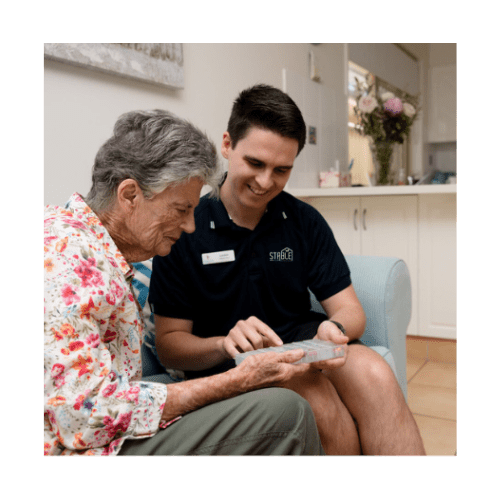Searching For Reliable Home Care Providers: Essential Tips for In Home Caregivers in Australia
Searching For Reliable Home Care Providers: Essential Tips for In Home Caregivers in Australia
Blog Article
The Growing Demand for In Home Care Givers: Factors Families Select Specialist Care Over Standard Facilities
The raising preference for in-home caregivers over typical centers is a substantial fad improving the landscape of older care. Households are drawn to the advantages of individualized care that straightens with individual needs and choices, allowing senior citizens to preserve a feeling of autonomy in an acquainted setting.
Personalization of Care
Personalization of care in home caregiving is crucial for satisfying the unique needs of each individual (home care providers). This technique makes sure that care plans are customized to the details needs of the individual, considering their case history, personal preferences, and lifestyle. By concentrating on the individual's unique situations, caregivers can foster a sense of self-respect and autonomy, which is typically doing not have in even more institutionalized settings

Furthermore, the ability to adapt care plans as needs advance is important. Home caregiving permits continuous observation and adjustment of treatment approaches, making certain that changes in health and wellness status or personal choices are promptly addressed. This flexibility not only boosts health and wellness outcomes however also improves the lifestyle for people getting care. Ultimately, personalized care in home setups dramatically adds to the general well-being of clients, making it an important part of modern caregiving practices.
Convenience of Home Environment
The convenience of a home atmosphere plays an essential function in the effectiveness of home caregiving. Several people, especially seniors, experience increased stress and anxiousness when placed in unknown setups such as typical treatment centers.
Moreover, the home setting permits for a tailored technique to caregiving, fitting private choices and regimens. Families can develop an atmosphere that reflects their loved one's way of living, ensuring that care is delivered in a manner that really feels comfortable and natural. This individualized setting motivates much better interaction and interaction in between customers and caregivers, fostering trust and relationship important for effective care.
Furthermore, the comfort of home can assist in social links, as family participants and friends can go to much more conveniently, offering crucial psychological assistance. ndis plan manager. In general, the home environment not only assists to keep dignity and freedom yet likewise contributes to a higher top quality of care, making it a favored selection for families looking for specialist caregiving options

Boosted Freedom for Seniors
Home caregiving not only offers convenience however also promotes enhanced independence for elders. Unlike conventional centers, in-home care permits seniors to keep their everyday regimens and engage in acquainted tasks within their own atmosphere. This freedom is critical for their emotional health and overall lifestyle.

Furthermore, in-home caregivers can adjust their solutions to provide specifically to the unique needs of each senior, promoting a better sense of control. This flexibility ensures that seniors can appreciate their hobbies, fraternize friends and family, and stay active in their areas, better boosting their sense of self-reliance.
Inevitably, in-home caregiving not only attends to the physical requirements of seniors but also equips them to lead meeting link lives, making it a significantly popular option for households seeking the very best care remedies for their enjoyed ones.
Cost-Effectiveness of In-Home Care
At home treatment uses a cost-efficient option to conventional nursing facilities, enabling households to give quality assistance for their loved ones without incurring expensive expenses. The expenses connected with retirement home can be overwhelming, commonly exceeding $100,000 each year, which can drain pipes economic resources rapidly. On the other hand, in-home treatment solutions typically charge on a per-visit or hourly basis, allowing households to tailor care strategies according to their spending plan and specific demands.
Additionally, at home care eliminates extra costs connected with facility living, such as room, board and transportation, and various management costs. Families can pick to engage caregivers only when required, potentially decreasing total expenditures. A considerable benefit of at home care is the capacity to preserve individual routines, which can contribute to far better psychological well-being and reduce the requirement for expensive clinical treatments arising from sudden way of living modifications.
Insurance protection, including long-term treatment insurance coverage, commonly includes in-home treatment services, better boosting monetary accessibility (ndis support coordinator). In general, the cost-effectiveness of at home treatment not just alleviates the financial worry on families but additionally promotes a much more customized approach to care that aligns with specific choices and demands
Building Stronger Family Links
Giving care in an acquainted atmosphere cultivates deeper household connections, enabling liked ones to actively join the caregiving her response process. In-home care develops possibilities for families to engage meaningfully with their handicapped or elderly relatives, promoting psychological bonds that can be hard to achieve in institutional setups. The visibility of specialist caretakers enables member of the family to focus on their relational roles instead of being burdened by the physical needs of treatment.
Furthermore, at home treatment permits families to maintain their valued regimens, which can lessen feelings of anxiousness and disorientation typically connected with relocation to care facilities. Shared meals, familiar surroundings, and the comfort of home provide a feeling of security that enhances health and fosters open interaction.
Households can team up with caregivers to develop individualized care plans that reflect the private choices and requirements of their enjoyed ones. This joint strategy not just equips the senior however additionally strengthens the family, as members share responsibilities and sustain each other via difficult times. Inevitably, at home treatment grows a nurturing setting where partnerships can flourish, boosting the lifestyle for both caregivers and receivers.
Verdict
The enhancing choice for in-home caregivers highlights a substantial change in just how families approach senior care. As these factors line up, in-home care emerges as an engaging option to conventional facilities, eventually promoting the well-being and high quality of life for seniors.
Family members are attracted to the advantages of individualized care that aligns with individual demands and choices, allowing senior citizens to maintain a sense of freedom in an acquainted setting.In-home treatment provides an affordable choice to typical nursing facilities, enabling families to provide quality support for their loved ones without sustaining outrageous expenditures. In comparison, at home care solutions typically bill on a hourly or per-visit basis, allowing families to customize treatment strategies according to their budget and specific requirements.
In-home treatment creates opportunities for households to involve meaningfully with their disabled or senior loved ones, advertising psychological bonds that can be challenging to attain in institutional settings.The enhancing preference for in-home caretakers highlights a substantial shift in how family members come close to elderly care.
Report this page